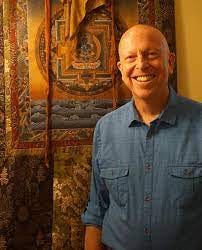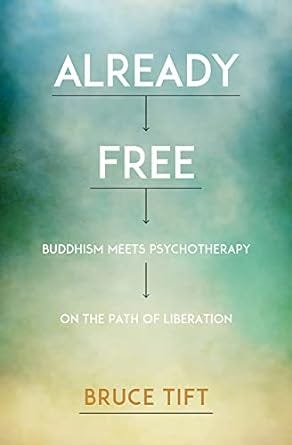“It has to do with identifying the specific feelings and experiences that we have organized our life around trying not to feel and then, intentionally, going into exactly those feelings, especially as immediate, embodied, sensation-level experience, with no interpretation at all.”
I once read that the average pay-per-view X-rated movie — back when people had to pay for pornography — played for an average of seven minutes. That was how long it took for the spark of desire (the fevered scrolling, the frenzied inputting of the credit card expiration date) to transform into a sodden ash-heap.
Self-help books, most of them, follow a similarly brief and ignoble arc through our lives. Driven by personal crisis or by some brief surge of unreasonable ambition, we fork over twenty dollars in exchange for the life-changing secrets of how to clean our rooms or repair our relationships — and then, often before we’ve even finished reading the introductions, we find ourselves beached back on the shores of mundane hopelessness. We’re not going to fill out these inane worksheets. We’re not going to remember this tortured acronym. Back the book goes onto the shelf for a brief rest before being carried out to the curb, where it will be picked up by someone else under a spell of senseless optimism (who will, upon getting home, be pleased to notice that the hectic underlining ends all at once on page eleven).
If my copy of Bruce Tift’s Already Free were, by some accident, to make it out onto the curb, I would sprint directly to the store to replace it. It lives happily on the border between Eastern spirituality and Western psychotherapy, and it’s the best self-help book I’ve ever read — one of the few that I’ve not only finished but that I’ve read multiple times, and in fact am more or less always reading, in the way that I’m always reading Alice Munro or Philip Roth. It doesn’t spend much time touting its own program or parading coyly-renamed patients before us. It doesn’t read like the blueprint for a podcast empire or a line of expensive workbooks. It reads like an extended note to the dog-sitter (There’s a towel hanging by the back door… Trash gets picked up on Tuesdays), only the dog you’re taking care of is your own psyche, and the gig will last for the rest of your life.
What distinguishes Already Free from its thousands of Buddhism-inflected-self-help brethren is its lack of gauziness, its frank grappling with what we’re all up against. “It’s extremely difficult to pretend we have our lives together when we’re in an intimate relationship,” Tift writes in the introduction, causing an immediate flutter of grateful recognition in anyone who has ever proceeded directly from a meditation cushion to an argument over the stubborn insanity of how you load the dishwasher.
But it isn’t merely that Tift recognizes the scale and obstinacy of our problems. It’s that he has solutions.
Think of “The Sorcerer’s Apprentice” (I’m referring not, of course, to the Goethe poem, but to the Mickey Mouse cartoon). Here you are being deluged by life’s difficulties — a quickly rising tide of illness and misfortune and tedium and anxiety. And along comes your typical self-help book (let’s called it The Joy of Sitting) offering a bucket. Feeling irritable while talking to your sister on the phone? Try noticing the sensations in your feet. Panicked by an unexpected call from school? Let the phone ring three times while reminding yourself of all the many times your worries have turned out to be unfounded.
It isn’t that these suggestions are wrong, exactly — calming down, in the face of all there is to be upset about, is in fact helpful, and a bucket does in fact carry a certain volume of water. It’s just that you would, in order to address the volume of life’s flood, need to spend every moment of every day doing nothing but filling and flinging buckets, and this might not be compatible with, say, shopping for dinner, to say nothing of being married or raising children.
The brilliance of Tift’s approach is that he, standing waist deep in rising water, doesn’t hand you a bucket at all. He hands you a swimsuit.
Panicked by an unexpected phone call from school? Well, answer the phone. But after you’ve done that, bring the panic back up — imagine all the horrible things the call could have been, get yourself into an absolute frenzy — and then dive in.
This is an informal technique I often use in my work. I call it the worst fear technique. It has to do with identifying the specific feelings and experiences that we have organized our life around trying not to feel and then, intentionally, going into exactly those feelings, especially as immediate, embodied, sensation-level experience, with no interpretation at all.
What I love, in Tift’s writing, is the calmness and unrelentingness with which he points you toward the water. … experiences that we have organized our life around trying not to feel… going into exactly those feelings… This is language that leaves no room for misinterpretation or wishful softening. Yes, even those feelings. And yes, you really have to be with them.
And this turns out — with practice, which Tift promises will be neither swift nor enjoyable — to be tremendously good news.
Because a peculiar feature of being frightened is that its unpleasantness, as an experience, is all out of scale with its actual bodily footprint. Fearing that something bad has happened, once you dig past the alarming inner headlines, actually feels like something — a coolness in the floor of your stomach, a tingle in your hands — and that something is just about always tolerable. The raw sensations of the feelings you hate most are hardly ever as painful as, say, the sensations that come with bashing your shin against the edge of a bed.
Tift addresses all the questions and qualifications that are likely fighting to get hold of your inner microphone (But bad things actually DO happen! Are you saying I should just sit there and feel my sensations while the world burns?), and you may be bothered or unsettled or even infuriated by his answers. But you won’t come away thinking that he must reside on some other, jasmine-scented planet. You will turn the pages knowing that the person who wrote them has experienced, and continues to experience, loss and shame and anger and dread. You will read to the end.




This reminds me a lot of The Worry Trick by David Carbonell, the only self-help book to ever actually change my life, aside from maybe How to Talk So Kids Will Listen and Listen So Kids Will Talk. I'll have to check this one out as a good booster. You definitely didn't steer me wrong with I Dream of Dinner—I've gotten some picky crowd pleasers out of it already.
I had a chilling convergence of this post and current events last night when my 9-year-old picked a Robert Frost poem at random from a table of contents. It was The Bonfire, a poem in which the narrator is talking to children and opens with, “Oh let’s go up the hill and scare ourselves…”
Towards the end he says, “But if you shrink from being scared,” the narrator asks, “what would you say to war if it were to come?”
“Oh but war’s not for children—it’s for men.” The children reply.
The narrator responds,
“Now we are digging almost down to China.
My dears, my dears, you thought that—we all thought it.
So your mistake was ours. Haven’t you heard though,
About the ships where war has found them out
At sea, about the towns where war has come
Through opening clouds at night with droning speed
Further o’erhead than all but stars and angels,—
And children the ships and in the towns?
Haven’t you heard what we have lived to learn?
Nothing so new—something we had forgotten:
War is for everyone, for children too.
I wasn’t going to tell you and I mustn’t.
The best way is to come up Hill with me
And have our fire and laugh and be afraid.”
The collection was published in 1916.